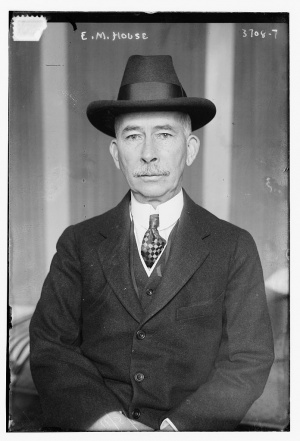Difference between revisions of "Edward Mandell House"
m (Handler) |
(Advisor to Wilson (imported from wikipedia)) |
||
| Line 18: | Line 18: | ||
==Activities== | ==Activities== | ||
| − | Little mentioned in history books, but so much of an insider that he actually ''lived'' in the [[White House]] as [[Woodrow Wilson]]'s [[handler]]. | + | Little mentioned in history books, but so much of an insider that he actually ''lived'' in the [[White House]] as [[Woodrow Wilson]]'s [[handler]]. |
| + | |||
| + | ==Advisor to Wilson== | ||
| + | |||
| + | After House withdrew from Texas politics and moved to New York, he became an advisor, close friend and supporter of New Jersey governor [[Woodrow Wilson]] in 1911, and helped him win the Democratic presidential nomination in 1912. He became an intimate of Wilson and helped set up his administration. | ||
| + | |||
| + | House was offered the cabinet position of his choice (except for [[United States Secretary of State|Secretary of State]], which was already pledged to [[William Jennings Bryan]]) but declined, choosing instead "to serve wherever and whenever possible." House was even provided living quarters within the White House. | ||
| + | |||
| + | He continued as an advisor to Wilson particularly in the area of foreign affairs. House functioned as Wilson's chief negotiator in Europe during the negotiations for peace (1917–1919) and as chief deputy for Wilson at the Paris Peace Conference. | ||
| + | |||
| + | In the [[1916 United States presidential election|1916 presidential election]], House declined any public role but was Wilson's top campaign advisor: "he planned its structure; set its tone; guided its finance; chose speakers, tactics, and strategy; and, not least, handled the campaign's greatest asset and greatest potential liability: its brilliant but temperamental candidate."<ref>{{cite book|author=Godfrey Hodgson|title=Woodrow Wilson's right hand: the life of Colonel Edward M. House|url=https://books.google.com/books?id=4jcL20ZS_KUC&pg=PA126|year=2006|publisher=Yale University Press|page=126|isbn=0300092695}}</ref> | ||
| + | |||
| + | After Wilson's first wife died in 1914, the President was even closer to House. However, Wilson's second wife, [[Edith Bolling Galt Wilson|Edith]], of whom he had commissioned the Swiss-born American artist [[Adolfo Müller-Ury]] (1862–1947) to paint a portrait in 1916, disliked House, and his position weakened. It is believed that her personal animosity was significantly responsible for Wilson's eventual decision to break with House. | ||
| + | |||
| + | [[File:ColonelHouse.PNG|thumb|right|225px|Col. House and President Wilson in 1915.<ref>{{cite news|title=Col. House Discusses Peace Outlook with Wilson|url=http://idnc.library.illinois.edu/cgi-bin/illinois?a=d&d=RIA19150628.1.8&e=-------en-20--1--txt-txIN-------|access-date=29 June 2015|publisher=Illinois Digital Newspaper Collections|date=June 28, 1915}}</ref>]] | ||
{{SMWDocs}} | {{SMWDocs}} | ||
| + | |||
==References== | ==References== | ||
{{reflist}} | {{reflist}} | ||
{{Stub}} | {{Stub}} | ||
Revision as of 23:15, 28 February 2021
(banker, deep state operative, handler, diplomat, politician) | |
|---|---|
 | |
| Born | Edward Mandell House July 26, 1858 Houston, Texas |
| Died | March 28, 1938 (Age 79) New York City |
| Parents | • Mary Elizabeth (Shearn) House • Thomas William House |
| Children | • Mona House • Janet House • ??? |
| Spouse | Loulie Hunter |
| Member of | Alpha Delta Phi, The Money Trust |
| Party | Democrat |
Edward Mandell House also known as Colonel House was a US deep state actor and an agent of influence for The Money Trust.
Activities
Little mentioned in history books, but so much of an insider that he actually lived in the White House as Woodrow Wilson's handler.
Advisor to Wilson
After House withdrew from Texas politics and moved to New York, he became an advisor, close friend and supporter of New Jersey governor Woodrow Wilson in 1911, and helped him win the Democratic presidential nomination in 1912. He became an intimate of Wilson and helped set up his administration.
House was offered the cabinet position of his choice (except for Secretary of State, which was already pledged to William Jennings Bryan) but declined, choosing instead "to serve wherever and whenever possible." House was even provided living quarters within the White House.
He continued as an advisor to Wilson particularly in the area of foreign affairs. House functioned as Wilson's chief negotiator in Europe during the negotiations for peace (1917–1919) and as chief deputy for Wilson at the Paris Peace Conference.
In the 1916 presidential election, House declined any public role but was Wilson's top campaign advisor: "he planned its structure; set its tone; guided its finance; chose speakers, tactics, and strategy; and, not least, handled the campaign's greatest asset and greatest potential liability: its brilliant but temperamental candidate."[1]
After Wilson's first wife died in 1914, the President was even closer to House. However, Wilson's second wife, Edith, of whom he had commissioned the Swiss-born American artist Adolfo Müller-Ury (1862–1947) to paint a portrait in 1916, disliked House, and his position weakened. It is believed that her personal animosity was significantly responsible for Wilson's eventual decision to break with House.
References
- ↑ Godfrey Hodgson (2006). Woodrow Wilson's right hand: the life of Colonel Edward M. House. Yale University Press. p. 126. ISBN 0300092695.Page Module:Citation/CS1/styles.css must have content model "Sanitized CSS" for TemplateStyles (current model is "Scribunto").
- ↑
{{URL|example.com|optional display text}}